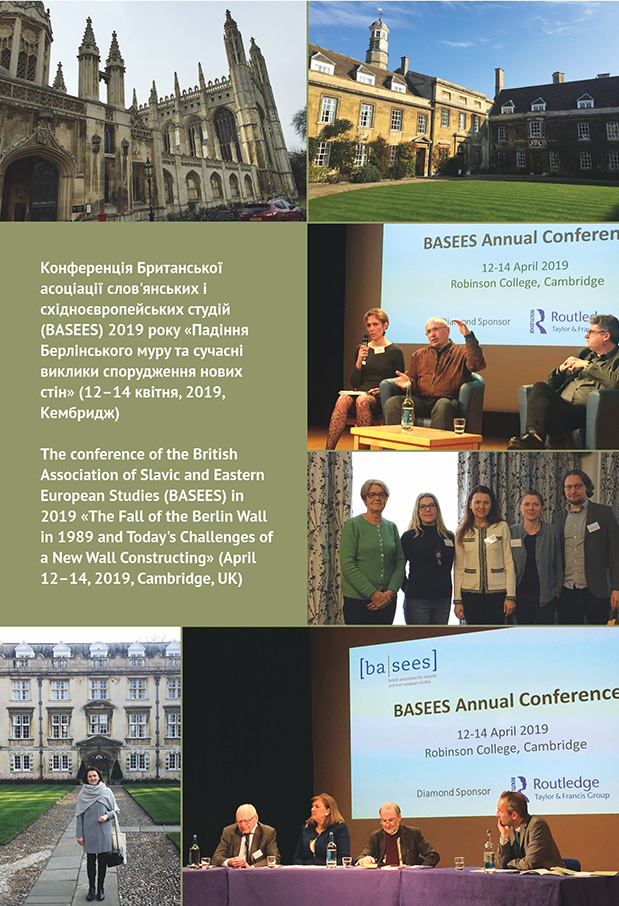The Fall of the Berlin Wall in 1989 and Today’s Challenges of a New Wall Constructing: Basees’ Reflection
(April 12–14, 2019, Cambridge, UK)
DOI:
https://doi.org/10.31874/2309-1606-2019-25-2-16Keywords:
democracy, digital age, freedom, education, hybridity, intellectual manipulation, science, post-truth, publicityAbstract
The conference of the British Association of Slavic and Eastern European Studies (BASEES) in 2019 was dedicated to the 30th anniversary of the fall of the Berlin Wall, the event that marked democracy triumph and liberation of communist authoritarianism. The focus was made on the factors of this victory, in particular on the role played in it by intellectuals of that time. The problem of scholars’ public activity was brought to the forefront by the thesis that achievements of science and education are not only theoretical developments and their successful assimilation in the form of knowledge, but also the level of influence science and education have in the society. Transition from instrumental rationality to rationality of values enhances practical importance of intellectual activity. Addressing this issue is particularly important in the context of crisis in the values of liberal democracy and increasing distrust of rational knowledge and culture. Modern technologies of manipulating consciousness contribute to the strengthening of authoritarian regimes. Therefore, the experience of intellectuals under communist authoritarianism must teach contemporary scholars to uphold the values of freedom and democracy and maintain social optimism. The discussion on the fall of the Berlin Wall proved that the scholars’ civic and academic positions reinforce each other, thereby forming a powerful defence against authoritarianism. However, the reincarnation of authoritarian sentiment nowadays provides grounds for accusing intellectuals of their inability to face up the challenges of the present. Among those challenges, we should mention forgetting the horribleness of old walls and illusions on benefits of constructing new ones.
References
[ba|sees] British association for Slavic and East European studies (2019) BASEES Annual Conference, 12–14 April 2019 Robinson College, Cambridge, United Kingdom, Routledge Taylor & Francis Group.
Gomilko O. (2018) Freedom and Progress in Postsocialist Challenges: Basees’ Reflection (April 13–15, 2018, Cambridge). Filosofia osvity. Philosophy of Education, 2018, 1 (22), 270–282 [in Ukrainian].
Gomilko O. (2016) Heartfelt Mutual Understanding in the Presence of a University’s Mightiness: Annual Conference [ba | sees] (April 2–4, 2016, Cambridge, UK), or Comfort beyond the «Comfort Zone». Filosofska dumka, 2016, 3, 90–100 [in Ukrainian].
Gomilko O. (2018) Hybridization as a Challenge to National Identity. In: Globalization and Cultural Identity. The Ukrainian Dimension. Kyiv : Naykova Dymka, 2018, 190–230 [in Ukrainian].
Harari Y. N. (2015) Sapiens. A Brief History of Humankind. VINTAGE: 2015.
Lukyanenko L. (2018) From Khokhol to Ukrainian: Reflections. Kyiv, 2018 [in Ukrainian].
Moore Martin (2019). Democracy Hacked. How Technology is Destabilizing Global Politics. Oneworld, 2019.
On Approval of the Procedure of Making the List of Scientific Professional Editions of Ukraine. URL: https://zakon.rada.gov.ua/laws/show/z0148-18 [in Ukrainian].

Downloads
-
PDF (Українська)
Downloads: 473
Published
How to Cite
Issue
Section
License
- Authors who publish with this journal agree to the following terms:
- Authors retain copyright and grant the journal right of first publication;
- Authors are able to enter into separate, additional contractual arrangements for the non-exclusive distribution of the journal's published version of the work (e.g., post it to an institutional repository or publish it in a book), with an acknowledgement of its initial publication in this journal.




